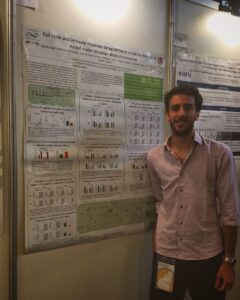Dysfunctions in clock-controlled body functions, such as sleep disorders, as well as deregulation of clock gene expression or glucocorticoid levels has been observed in cancer patients. Moreover, these disorders have been associated with a poor prognosis. This work explored the circadian rhythms at behavioral and molecular levels in a murine melanoma model induced by subcutaneous inoculation of B16 tumoral cells. We observed that the presence of the tumors induced a decrease in the sturdiness of the locomotor activity rhythms and in the amount of night time activity together with a delay in the acrophase and in the activity onset. Moreover, these differences were more marked when the tumor size was larger than in the initial stages of the tumorigenesis protocol. In addition, serum glucocorticoids, which have strong clock-controlled rhythms, lost their circadian patterns. Similarly, the rhythmic expression of the clock genes Bmal1 and Cry1 in the hypothalamic Suprachiasmatic Nuclei (SCN, the central clock) were also abolished in mice carrying tumors. Altogether, these results suggest that tumor-secreted molecules (tumor macroenvironment) could modulate the function of the central circadian pacemaker (SCN). This could account for the worsening of the peripheral biological rhythms such as the locomotor activity or the serum glucocorticoids. The knowledge of the circadian rhythms in cancer patients could be useful to improve their quality of life. Moreover, since the deregulation

Menu
E-poster
Session: 2
PS2-02 | Circadian disruption induced by tumor development in a murine model of melanoma
Ignacio Aiello
Laboratorio de cronobiología, departamento de ciencia y tecnología, Universidad Nacional de Quilmes
- Bernal,
- Argentina
- Ignacio Aiello1
- , Malena Lis Mul Fedele2
- , Fernanda Ruth Roman1
- , Diego Andres Golombek1
- , Natalia Paladino1
- 1. Laboratorio de cronobiologia, departamento de Ciencia y tecnologia, Universidad Nacional de Quilmes
- 2. Laboratorio de Cronofisiología, Instituto de Investigaciones Biomédicas (UCA-CONICET), Buenos Aires, Argentina.
